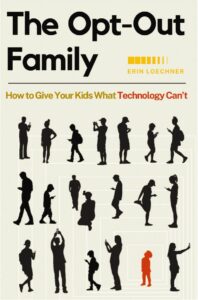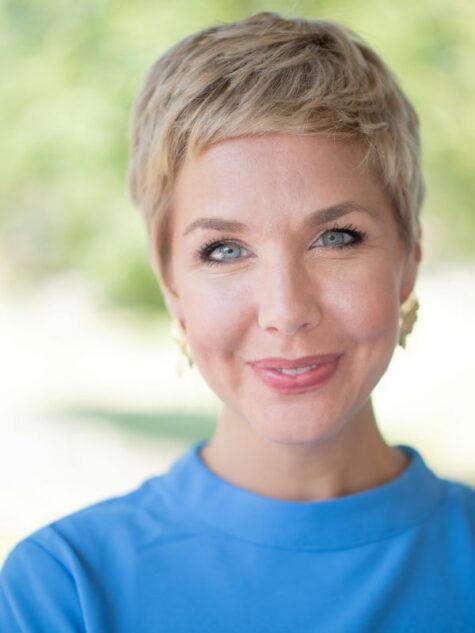Social media influencer Erin Loechner walked away from a million fans – literally — to live a low-tech and, dare we say it, Free-Range lifestyle. Among other things, this involved a deliberate decision, described below, NOT to track her daughter, even though the 8-year-old was going around the neighborhood, alone.
Chasing Slow, Erin’s first book, was a bestseller. Now she’s inspiring others, including kids, to reconnect with the real world through her new book The Opt-Out Family: How to Give Your Kids What Technology Can’t. Erin, her husband, and their three kids, 12, 8, and 4. This Q & A, which first ran on LetGrow.org, has been edited for length and clarity.
Me: So fun to meet you! Can we dive right in and ask you for an example of opting out? Something mundane, even?
Erin Loechner: One day when my daughter was five she came running to house from the pond. “I saw the weirdest creature! It had a spiky tail and the head of a beaver!” We don’t Google solutions – we have a house phone. So I said okay, why don’t we call Dave — a science teacher on the other side of the pond. And Dave said, “It was a mother muskrat making a nest, meet me there.”
Observing vs. Googling.
Wow! So going slow means…
Not being quite so wrapped up in the productivity of life. I was a waitress in college and I couldn’t be kind and fast at the same time. To get your order really fast, everybody needs to get out of my way. Or I can take my time and have some margin for eye contact and all of that. So for me, I choose to take things a little slower.
How does that work in a family situation?
When I would make dinner, I would say to everybody, “You can go jump on the trampoline for 20 minutes — or you guys can pull up a chair and join me in this, and it’s probably going to take a little longer and it’s probably going to be a lot messier.”
Soooo much messier. What do kids get from that slower option?
When we talk about childhood independence, where else are they going to learn how to cook and set the table — and the art of prioritizing relationships?
Why Erin let her daughter, at age 8, roam.
So tell me what your kids have learned.
My daughter is almost 12. But, gosh, three or four years ago she wanted to sell tomato plants: Make a logo, package them, the whole nine yards. And you know that when when a kid has an idea, it’s kind of the parents’ project by default, because they have to be involved in the transportation and all of the mechanics. I said, “Honestly, I can’t put this on my plate right now.” And she said. “I don’t need a thing. I’m going to use the wagon. I just need your permission to go through the neighborhood and knock on doors.”
So what happened?
We had a quiet house for a couple hours and she sold all the tomato plants.
Bingo! Has she done anything like that since?
Every summer it’s her thing. I’m looking at the tomato plants right now.
Why Erin let her son, when he was 8, chop and cook.
So how about your current 8-year-old?
We say a lot that, “If you see something, do something. If there’s a sock on the floor, I don’t actually care who it belongs to, do something about it.” We really try to work with him on that. And just today, he made everybody’s lunch.
PB&J?
Pot roast. He heated it up. Okay, what does it need on the side? Let’s do fruit and veggies. So he’s got one of those kid knives that actually seem far more dangerous.
True! The dull knife is the one that’s going to kill you.
So sometimes he just uses his pocket knife. I think that’s the real joy for him.
And does your 4-year-old chop vegetables, too?
She likes to fold the laundry. Anything you can fold into a square, she’s in.
So you have an entrepreneur, a sous chef, and a laundress. Why is it important to have kids to do things on their own?
We all need to know that we can handle ourselves in the world. That confidence comes from far more than just saying, “Good job, Charlie!” Charlie needs to know that Charlie can do life.
None of this is done without some worry.
Was there ever a time you were hesitant to let go?
Well, I would say a big one was my daughter selling plants to the neighborhood. Honestly, I did that thing where we — you know how the iPhone has the “Track my iPhone” feature? My husband kind of stuck it in her wagon. But then I thought: I don’t like this. We need practice letting go. So we gave her all the pointers like, “This is a house you can stop at if you need anything.” It was hard for me. The first time is very hard. But we took the iPhone out and said, “We’re going to do walkie-talkies.” We want to equip her to meet humanity. That really set the tone for, “Okay, what else can they do without me surveilling them?”
Do they have phones?
No, we have a landline, so they can call their friends.
But you have to think about risk differently.
How do you talk to your friends about letting your kids go around on their own?
Life is risk versus reward. When I talked to a Silicon Valley investor for this book, I wanted to know, “How do you guys think about prioritizing risk and reward and what can we as parents learn from that?” And one of the most wonderful things that I learned about is First Order Thinking vs. Second Order Thinking. So instead of thinking about solving the immediate problem – First Order Thinking – Second Order is asking, “What then, and what then, and what then?”
You game it out?
Yes. So that’s what’s going through my head when I’m saying something like, “No, you can’t go to the bathroom at Culvers by yourself.” What will my son take away from that experience? Does he now think that all bathrooms are unsafe? Does he now wonder about just general safety?
So you opt for a little discomfort in the short run?
If my child thinks he’s less capable or less safe in this world, is it worth it? That’s a question worth asking.
Here’s another: What’s Culvers?
It’s a cheese curd burger joint.
Erin’s advice on how to not worry about kidnapping.
Oh. Last question, I think: When you let your kids do some things unsupervised – without a phone – how do you not worry about abduction?
Honestly, the research helps you — knowing that it very unlikely. I also think of the people in my own life that have been through really horrific things and what they’ve overcome. I just think we can always [cope]. This probably stems from my husband having a brain tumor.
Oh my! Did he have it when you married him?
Yes. And I would rather him be in my life than not in my life, so I learned from the get-go: this is life. If you think, “This could be a threat, that could be a threat…” you’re going to exhaust yourself as a parent. And you’re not going to have any room for the fun.
Modern parenting in a nutshell! To fight it, embrace the radical idea of trusting your kids!

Erin’s newest book, The Opt-Out Family.



